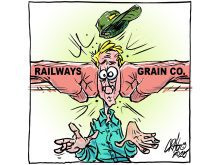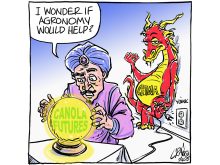Farm commodities and farming in general are under tremendous pressure to be better and be better understood.
Better able to stand a highly variable climate. Better able to meet rapidly evolving regulatory change. Better able to provide market demands for new nutrition and energy sources. Better able to produce ever-more with ever-less.
And they need industry support when it comes to ensuring that any of these things occur. Financially, this relies on checkoffs.
Whether it is by the head or by the tonne, at the beginning or at the end, checkoffs pay for the future of farming. Whether it improves genetics, agronomy, husbandry or risk management, checkoffs, often matched by governments and industry, drive change in farmers’ favour.
Read Also

Downturn in grain farm economics threatens to be long term
We might look back at this fall as the turning point in grain farm economics — the point where making money became really difficult.
Farmers heard recently that some accounting firms recommend that producers ask for refunds of their checkoff money and pay taxes on it, as well as tax deductible accountants’ fees.
It wasn’t a surprise to some farmers; their own financial advisors had recommended it. But to many, this was a bit of a shock because their commodity groups are the ones that use the relatively small sums to collectively do big things on their behalf – things those groups’ leaders were elected by farmers to do.
In most cases, checkoffs are mandatory and refundable. They are tax deductible and create an opportunity to collect science tax credits as well.
There have always been a few producers who want to ride on the coattails of others. And there have been times when a few dollars per acre or head is a significant percentage of that year’s margin. In such cases, asking for checkoff refunds is understandable. But for most farmers in todays’ economy, that isn’t the case and hasn’t been for a long time.
Of course, not every farmer agrees with every commodity commission’s decisions or priorities, if, in fact, they even follow what those groups are doing.
More likely, those taking their accountants’ advice to maximize their margins by shorting the rest of their industry in terms of research, market awareness or government lobbying, don’t bother to learn what their commodity groups are doing for them. A quick review of the activities and results would likely cause them to leave their money invested in the future of agriculture.
Governments of all stripes have been making it clear for decades that they want to invest as little as possible in primary production agriculture and international trade. Only recently did the federal government step up with significant new investments in research and risk management. In the latter case, they brought a couple of the provinces with them, even though there was kicking and screaming. The rest of the federal money is tied to climate change initiatives.
All of it, one way or another, is tied to farmers and their associations that match some of that funding.
Whether it is genetics research, investing in a new grain drier or putting time and energy – and likely some accounting fees – into an environmental farm plan to get matching government deposits into a risk management account, it’s expected that farmers contribute a share. And the lions’ share of that comes through checkoff dollars.
If farmers don’t invest in their futures, it is hard to imagine why governments and industry would do so. Accountants wouldn’t step up and do it either.
Karen Briere, Bruce Dyck, Barb Glen and Mike Raine collaborate in the writing of Western Producer editorials.

















